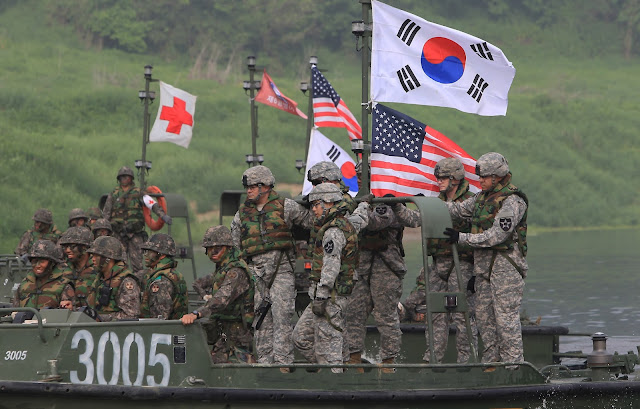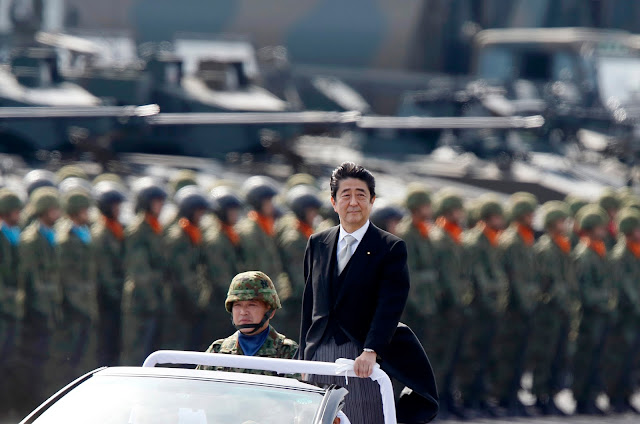Seoul Presses U.S. to Hand Over Wartime Command of South Korean Military
South Korea is pushing the U.S. to allow it to take control of its own military forces should war break out on the Korean Peninsula, but the Americans are concerned that Seoul isn’t ready, according to U.S. officials.
The issue creates a potential fault line between the two allies amid a growing threat from North Korea.
The topic is set to feature prominently in security talks that start Friday in Seoul during a visit by Defense Secretary Jim Mattis.
Mr. Mattis on Friday visited the demilitarized zone that divides the two Koreas. “We stand shoulder to shoulder with you and the Korean people in confronting the threats posed by the Kim Jong Un regime,” Mr. Mattis said, standing beside South Korea’s Defense Minister, Song Young-moo.
 South Korea has day-to-day control of its own military, but under an agreement in place since the Korean War in the 1950s, the U.S. would assume operational control of both the U.S. and South Korean militaries in the event of a major conflict on the peninsula. The U.S. maintains approximately 28,500 forces in South Korea.
South Korea has day-to-day control of its own military, but under an agreement in place since the Korean War in the 1950s, the U.S. would assume operational control of both the U.S. and South Korean militaries in the event of a major conflict on the peninsula. The U.S. maintains approximately 28,500 forces in South Korea.
The U.S. for years urged South Korea to prepare to take command of its own forces in the event of war with North Korea, but South Korea’s military has asked repeatedly that the U.S. delay the transfer, saying it needed more time to invest in its forces and sharpen its capabilities.
Successive conservative governments in South Korea mostly accepted the delays. Now, Seoul’s first left-leaning government in a decade, loath to be dragged by the U.S. into what it may see as an unnecessary conflict, is turning the tables and asking to accelerate transfer of what is known in military shorthand as “op-con.”
Washington isn’t inclined to relinquish control. North Korean leader Kim Jong Un’s frequent ballistic missile launches, public threats of nuclear war and other provocations have made the U.S. leery of handing over the reins, according to U.S. officials. “I don’t think anyone is eager to see op-con transfer given how tense things are on the peninsula,” one of the officials said.
The issue is expected to be aired generally during security talks over the next couple of days. But U.S. officials are trying to stave off any formal movement toward the transfer of operational control, officials said.
“It is rearing its head again and I don’t think the Pentagon is eager to have this conversation when there is a lot more stuff that is more pressing,” said the U.S. official.
A South Korean Defense Ministry spokesman said that the transfer of op-con would be on the agenda between the two allies, but declined to say which side had requested the issue be raised. Capt. Jeff Davis, a Pentagon spokesman, said the U.S. hasn’t changed its position on the matter.
“We remain committed to helping the Republic of Korea develop the capabilities they need to assume responsibility for ROK-led defense of the Korean Peninsula,” Capt. Davis said, referring to South Korea by its formal name. “This has been our consistent position for years.”
The op-con question has a long history between the two allies, dating to when then-Defense Secretary Donald Rumsfeld in 2005 sought to reduce the American presence on the Korean Peninsula and transfer more security responsibility to the South Koreans.
After a series of missed deadlines over the years, the U.S. and South Korea agreed in 2013 to delay transfer indefinitely, deciding that control of the South Korean military would only be handed over on condition that South Korea was able to demonstrate certain capabilities.
The U.S. wants the South Korean military to improve its ballistic missile defense capabilities and its “command-and-control” know-how, among other issues, U.S. officials said.
A former U.S. State Department official who believes there should be no rush to hand over operational control said the current alliance is “highly functional.”
The election of left-leaning President Moon Jae-in has changed Seoul’s calculus. Many on South Korea’s political left see the lack of military control as an embarrassment that exposes the country to criticisms from Pyongyang that South Korea is a puppet state of the U.S.
In a speech last month to mark Armed Forces Day, Mr. Moon framed the early takeover of wartime operational control as an opportunity for Seoul to beef up its own native military capabilities.
“With elevated self-esteem, our military will become stronger, and the Republic of Korea will emerge as a security hub in Northeast Asia,” Mr. Moon said.
Michael Mazarr, a senior political scientist with Rand Corp., said that there was a possibility, given Mr. Moon’s strong push, that the two sides could agree to establish a new command structure to replace the existing one that oversees U.S.-Korean military operations.








Comments
Post a Comment